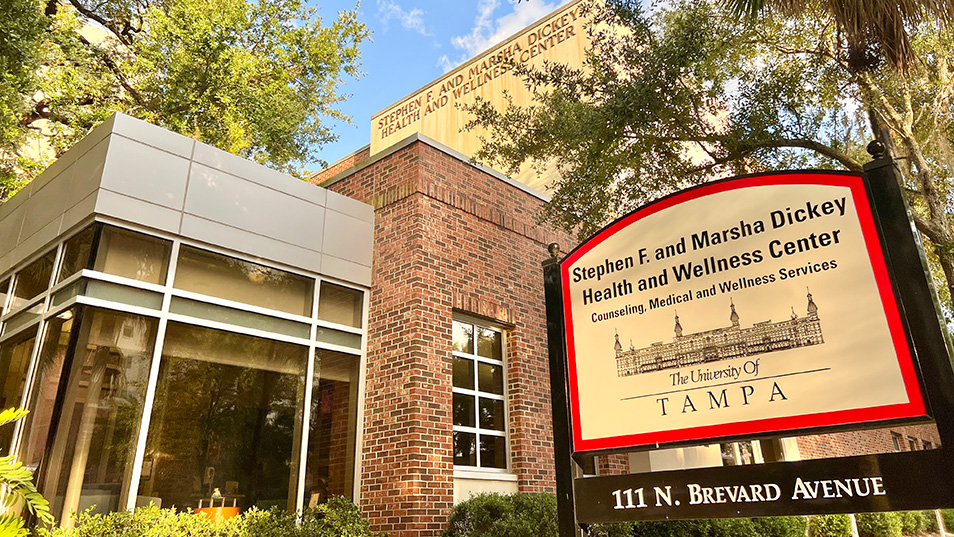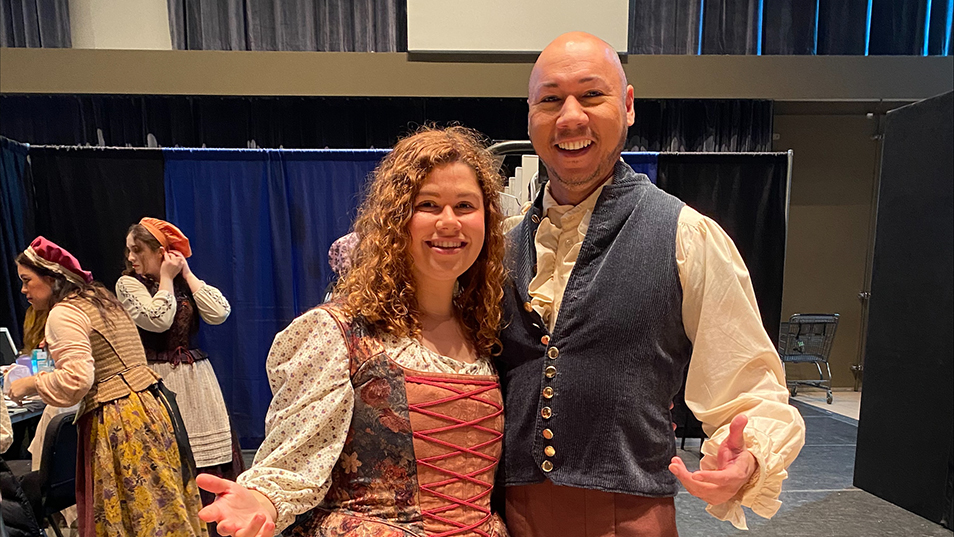Published: May 31, 2022
UT Completes Four-Year Program Focused on Strengthening Emotional Health
The University of Tampa recently completed its four-year partnership with the JED Foundation (JED), a nonprofit organization dedicated to promoting emotional health and preventing suicide among young adults.
The outcome has been a host of programming and policies implemented to “engage people where they’re at,” said Gina Firth, assistant vice president for wellness.

The University of Tampa recently completed its four-year partnership with the JED Foundation (JED), a nonprofit organization dedicated to promoting emotional health and preventing suicide among young adults.
The approach will be adapted as students and their needs evolve, she said.
“Every student is at a different place,” she said. “The comprehensive programming gives the students what they need in a variety of different ways.”
Not every student will require or benefit traditional talk therapy, she said. Other students may benefit more from different resources, Firth said.
Erica Riba, director of higher education and student engagement at the university-focused program of the foundation called JED Campus, was UT’s representative during the program.
She said the purpose of the program is “ensuring that mental health is everybody’s responsibility, that mental health can no longer just fall on counseling centers and wellness services.”
JED Campus allows universities to assess and build on existing mental health offerings and offers support, feedback, strategic planning and implementation of recommendations.
The JED Campus multidisciplinary team, led by Firth, consisted of 35 faculty, staff and students who met regularly and implemented a comprehensive strategic plan for the University. This seven-item plan focused on developing independent living skills, social and emotional skills, and resiliency; fostering connectedness and belonging; increasing the University’s ability to identify students at risk or who may be struggling; increasing help-seeking behavior; ensuring the right policies and protocols are in place to support students and manage crisis; ensuring the availability of high-quality services; and promoting means safety to reduce suicide. As a JED Campus alum, this multi-disciplinary team will continue this important work moving forward, according to Firth.
“It took everybody out of silos,” said Firth of the team. “We want to make mental health and wellbeing inescapable on campus,” she said, so that there’s a wide safety net for those seeking help.
Suicide is the 10th leading cause of death in the United States overall, and the second leading cause among persons aged 10–34, according to statistics from the Center for Disease Control and Prevention.
Before starting the program, Firth said the program seemed like a good fit for what the University needed at the time.
Outcomes
Spartan Ready and Spartan Connect are just two of the resources that came about during the four-year program.
Through curricular work and co-curricular experiences, Spartan Ready teaches students how to have an advanced understanding of their field, the workplace and how to be effective leaders.
Students develop high-demand competencies, which include communication, critical thinking, leadership, professionalism and teamwork that lead to achievement in academics, career readiness, life preparedness and social mobility.
Emilie Morris, coordinator of student competency development programs, said Spartan Ready is best described as a culture or a goal.
“Faculty and staff are wanting students to feel ready for life after UT, whatever that may be for students,” such as graduate school, a first job or service work, Morris said.
“Regardless of the environment students find themselves in after graduation, the skills and competencies included in Spartan Ready ensure they can be successful leaders.”
Spartan Connect is a cohort-based initiative that serves first-year students who are living off campus through providing intentional programming, social opportunities and peer-to-peer mentoring to enhance their sense of belonging, resiliency and well-being.
Increasing the Safety Net
The Spartan Support Program (formerly Student of Concern) was rebranded in an effort to reduce stigma around receiving help.
“It takes away some of the crisis language,” Riba said, and takes a more holistic, preventative approach.”
The Spartan Support Program identifies and addresses students who may be struggling in ways that interfere with learning, development, success and/or community welfare. Student support is accomplished through campus and community collaboration which may include assessment, triage, recommendation and utilization of resources, and individual planning and monitoring.
Throughout the four-year program, several trainings were developed, including a mental health first aid training, an eight-hour program designed to increase skills in assisting people struggling and get them where they need to be, a two-hour suicide prevention gatekeeper training and a 50-minute peer-led program called “How to help a friend.”
These trainings, Firth said, will increase the safety net by multiplying the number of people able to recognize the signs and symptoms of someone struggling, educate about resources available and help students take care of what they need to thrive.
Riba said The University of Tampa has done a “tremendous job” on messaging and campaigns on help-seeking, including messaging around campus with QR codes, a code that can be scanned with your phone, so students can engage with this work.
The keys to continuing the work the partnership started, Riba said, are awareness, collaboration and connection.
“We want more people to be trained; we want more awareness that these trainings exist,” Riba said.
Diversity, Equity and Inclusion
Riba said the University exhibited major growth and has done a lot in the areas of diversity, equity and inclusion.
Chief Diversity Officer Thomas Witherspoon was hired in August of 2021 and is responsible for developing a diversity strategic plan to achieve diversity, equity and inclusion goals and objectives that support UT’s mission
Riba said it’s crucial “everyone feels included and is engaging with campus-wide events.
It’s ideal that everyone feels part of the community here.”
Upon completing the program, The University of Tampa is now part of the JED Campus alumni, which allows for continued access and support from JED, the ability to connect with other schools to peruse best practices and have an outlet to problem solve.
Firth said the task force that was implemented during the JED partnership will remain intact and continue to meet, and work on identifying trends, problems, and continue to work towards finding solutions and providing the best support for students.
Have a story idea? Contact Brianna Kwasnik, Digital Content Editor/Writer
Read more UT Life stories.
Subscribe to News and UT Life.



